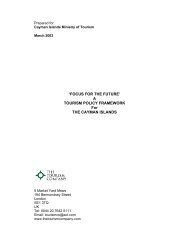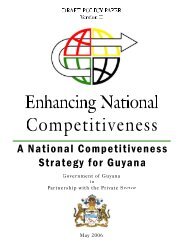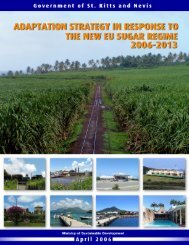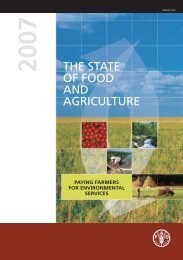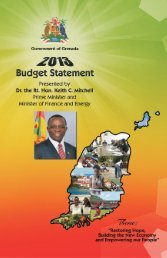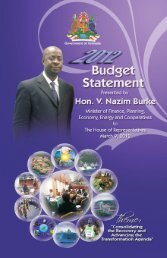Focus on Barbados Budget
EY - Caribbean Elections
EY - Caribbean Elections
- No tags were found...
You also want an ePaper? Increase the reach of your titles
YUMPU automatically turns print PDFs into web optimized ePapers that Google loves.
<str<strong>on</strong>g>Focus</str<strong>on</strong>g> <strong>on</strong><br />
<strong>Barbados</strong> <strong>Budget</strong><br />
2012
Table of c<strong>on</strong>tents<br />
Executive summary..................................1<br />
<strong>Budget</strong> commentary.................................4<br />
Ernst & Young Caribbean tax leaders......14<br />
<strong>Barbados</strong> tax managers..........................14<br />
C<strong>on</strong>tact informati<strong>on</strong>...............................15
Executive summary<br />
Too little too late?<br />
The H<strong>on</strong>ourable Minister of Finance, Christopher Sinckler, presented his third budget against the<br />
backdrop of impending electi<strong>on</strong>s and in the c<strong>on</strong>text of a fragile <strong>Barbados</strong> ec<strong>on</strong>omic recovery. In this<br />
most challenging global ec<strong>on</strong>omic envir<strong>on</strong>ment in generati<strong>on</strong>s, the Minister was swift to highlight<br />
some c<strong>on</strong>structive developments in the fiscal affairs of the country achieved by his Government. These<br />
included the island’s positive first quarter ec<strong>on</strong>omic growth, and improvements in our current account<br />
deficit.<br />
Counterbalancing these glimmers of hope, the Minister was forced to acknowledge that stubbornly high<br />
unemployment rates c<strong>on</strong>tinue unabated, inflati<strong>on</strong> remains above any reas<strong>on</strong>able medium term target<br />
and the ec<strong>on</strong>omic outlook remains <strong>on</strong>e of tepid growth and c<strong>on</strong>tinued deficit spending. Faced with these<br />
multiple threats the Minister attempted to articulate a balanced course between growth and austerity<br />
c<strong>on</strong>structed around a mixture of traditi<strong>on</strong>al and novel fiscal measures.<br />
The Central Bank of <strong>Barbados</strong>’ 2012 first quarter ec<strong>on</strong>omic review characterised the performance in the<br />
ec<strong>on</strong>omy as stable with marginal growth. However, we believe that growth will c<strong>on</strong>tinue to be sluggish<br />
given the weakened tourism sector and the need for Government to implement sharper cuts to fiscal<br />
spending. Tourism c<strong>on</strong>tinues to be a major driver of ec<strong>on</strong>omic activity, c<strong>on</strong>tributing 12% of GDP in 2011<br />
and approximately 40% of the Island’s total foreign exchange earnings. While the review for the first<br />
quarter signals increased tourist arrivals; shorter stays, reduced spending and declining cruise ship<br />
arrivals have reduced the current account inflows from the sector.<br />
The fragility of the ec<strong>on</strong>omy may also be c<strong>on</strong>sidered in terms of the levels of Gross Internati<strong>on</strong>al Reserves<br />
(weeks of imports) which have steadily declined since 2009 (see graph below). While the first quarter<br />
shows upward movement from 15 weeks (December 2011) to 16 weeks (March 2012) approximately, it<br />
must be noted that <strong>on</strong>e level is measured as at December (half way through the tourism seas<strong>on</strong>), and the<br />
other measured as at March (the end of our main tourism seas<strong>on</strong>).<br />
1 <str<strong>on</strong>g>Focus</str<strong>on</strong>g> <strong>on</strong> <strong>Barbados</strong> <strong>Budget</strong> 2012
Executive summary c<strong>on</strong>t’d<br />
Bey<strong>on</strong>d the next few m<strong>on</strong>ths, the increasing debt balance and the c<strong>on</strong>sequential increasing cost of debt<br />
(higher interest) will exert more pressure <strong>on</strong> foreign reserves. On a positive note, just under <strong>on</strong>e third of<br />
Government’s debt is denominated in foreign currencies. However, the Government c<strong>on</strong>tinues to finance<br />
a significant porti<strong>on</strong> of its rising debt from domestic sources, primarily NIS, private and n<strong>on</strong>-bank entities<br />
through the issuance of treasury bills and debentures.<br />
During the fiscal period, Government implemented a revised method of calculating the debt-to-GDP<br />
statistic. By c<strong>on</strong>solidating Nati<strong>on</strong>al Insurance (“NIS”) with Government, the revised ratios as at March<br />
2012 are as follows:<br />
Gross Central Government debt to GDP (%)<br />
(NIS)<br />
2005 2006 2007 2008 2009 2010 2011<br />
49 49 53 57 66 74 78<br />
Source: Central Bank of <strong>Barbados</strong>, Ec<strong>on</strong>omic Review March 2012<br />
While the revised calculati<strong>on</strong> is based <strong>on</strong> a recommendati<strong>on</strong> of major internati<strong>on</strong>al ec<strong>on</strong>omic instituti<strong>on</strong>s,<br />
many analysts argue that it distorts the true ec<strong>on</strong>omic positi<strong>on</strong> of Government. Though not readily<br />
comparable, c<strong>on</strong>sider the Central Bank’s Debt-to-GDP ratio of 97% (based <strong>on</strong> previous calculati<strong>on</strong>) as at<br />
December 2011 compared to the March 2012 ratio of 78% (based <strong>on</strong> revised calculati<strong>on</strong>).<br />
Similar to budget presentati<strong>on</strong>s in the past, the Minister addressed a number of policies some more<br />
material and c<strong>on</strong>sequential than others. In our view am<strong>on</strong>g the most significant measures were: the<br />
reducti<strong>on</strong> in pers<strong>on</strong>al tax rates to 17.5% for the first income band; the impositi<strong>on</strong> of a nati<strong>on</strong>al greening<br />
levy; the changes in the taxati<strong>on</strong> of the internati<strong>on</strong>al business sector; the clarificati<strong>on</strong> and liberalisati<strong>on</strong> of<br />
immigrati<strong>on</strong> policy for high net worth individuals; the divestment by public offering of certain Government<br />
owned entities; the introducti<strong>on</strong> of incentives for listing <strong>on</strong> the junior stock exchange and the utilizati<strong>on</strong> of<br />
NIS funding for strategic investments.<br />
In terms of pers<strong>on</strong>al taxati<strong>on</strong> the Minister acknowledged the removal of the pers<strong>on</strong>al allowances available<br />
by custom for the middle class had the effect of decreasing disposable income. Yet the Government did<br />
not see it prudent to reintroduce the disc<strong>on</strong>tinued incentives which the Minister stressed was subject to<br />
some measure of abuse in the past. Instead the Government opted to increase the lower threshold of<br />
taxati<strong>on</strong> from $24,200 to $30,000 and reduce the tax rate <strong>on</strong> the first $30,000 of taxable income to<br />
17.5% to deliver a modicum of relief to taxpayers with an expected loss to the Treasury of $29 milli<strong>on</strong>. This<br />
gesture was partly offset by the $15 milli<strong>on</strong> impositi<strong>on</strong> of a nati<strong>on</strong>al greening levy <strong>on</strong> individuals at rates<br />
ranging up to 0.25% aimed at defraying the rising cost of sanitati<strong>on</strong> services. We found it interesting that<br />
the Administrati<strong>on</strong> sought it fit to levy the green fund impositi<strong>on</strong> <strong>on</strong> individuals rather than <strong>on</strong> businesses<br />
as is d<strong>on</strong>e in other Caribbean territories such as Trinidad & Tobago where a similar levy called the Green<br />
Fund Levy is principally imposed <strong>on</strong> corporate tax payers. In additi<strong>on</strong>, the net benefit to tax payers created<br />
by these two opposing measures seems relatively immaterial and is unlikely to offer the level of tax payer<br />
relief promoted.<br />
<str<strong>on</strong>g>Focus</str<strong>on</strong>g> <strong>on</strong> <strong>Barbados</strong> <strong>Budget</strong> 2012<br />
2
Executive summary c<strong>on</strong>t’d<br />
The Minister clearly articulated the challenges faced by the Internati<strong>on</strong>al Business Sector by certain<br />
changes to the Canadian domestic tax rules that effectively eliminated <strong>Barbados</strong>’ previous advantage over<br />
its zero tax Caribbean neighbours. Our Firm participated in some of this analysis and discussi<strong>on</strong>s and,<br />
although the reducti<strong>on</strong> in the lower rate of tax for internati<strong>on</strong>al business vehicles <strong>on</strong> income over $30<br />
milli<strong>on</strong> to 0.5% in 2012 and 0.25% in 2013 is a bitter pill to swallow, it was essential to forestall what may<br />
have been a more significant migrati<strong>on</strong> of Canadian owned businesses from <strong>Barbados</strong>. We also welcome<br />
the clarificati<strong>on</strong> of our immigrati<strong>on</strong>s laws which should help make the island more friendly to credible<br />
foreign investors and raise much needed fees and offer trickle down ec<strong>on</strong>omic benefits for the<br />
<strong>Barbados</strong> ec<strong>on</strong>omy.<br />
In these difficult ec<strong>on</strong>omic times it is not unusual for governments to seek unc<strong>on</strong>venti<strong>on</strong>al means of raising<br />
revenues. In this c<strong>on</strong>text, the Minister announced the full or partial divestment of three Government owned<br />
entities: the Grantley Adams Internati<strong>on</strong>al Airport, the Oil Company and the <strong>Barbados</strong> Port Authority,<br />
by way of public offerings. This move is welcomed and if properly executed should have the cascading<br />
benefit of stimulating the island’s stagnant capital markets, raising Government revenue and improving the<br />
corporate governance of these entities.<br />
In similar vein to our Caribbean neighbours, Jamaica and Trinidad & Tobago, the Government announced<br />
new incentives to stimulate listing of small and medium sized entities <strong>on</strong> the junior stock exchange. A<br />
similar measure was introduced in Jamaica and has been met with the successful listing of over ten<br />
companies. C<strong>on</strong>versely, in Trinidad & Tobago the incentive has just been enacted and is now being<br />
launched. Although the <strong>Barbados</strong> tax incentives appear attractive <strong>on</strong> the surface, the c<strong>on</strong>diti<strong>on</strong>s placed<br />
up<strong>on</strong> significant ownership by <strong>on</strong>e shareholder of no more than 25% and a minimum of 50 shareholders<br />
appear too restrictive and may act as a disincentive for family owned businesses to go public. By c<strong>on</strong>trast<br />
both Jamaica and Trinidad & Tobago allow for majority c<strong>on</strong>trol by certain founding shareholders, whilst at<br />
the same time mandating at least 20% - 30% of the shares be held by the investing public for benefits to<br />
be obtained.<br />
Perhaps the most novel approach articulated by the Minister in this budget is the selective use of NIS<br />
surpluses for nati<strong>on</strong>al strategic type investments. On the <strong>on</strong>e hand this is certainly an innovative approach<br />
and arguably leads to more l<strong>on</strong>g term investment opti<strong>on</strong>s for an NIS, which the Minister stated is in an<br />
advantageous surplus situati<strong>on</strong>. On the other hand, analysts have been quick to point out the dangers of<br />
Government directed investment of pensi<strong>on</strong>ers’ funds.<br />
In his third budget presentati<strong>on</strong>, the Minister perhaps went further than he ever did before in attempting<br />
to strike the crucial balance between growth and austerity so necessary at this stage in the country’s<br />
ec<strong>on</strong>omic cycle. Certainly there were various c<strong>on</strong>structive measures discussed and passed especially<br />
c<strong>on</strong>cerning the island’s internati<strong>on</strong>al business sector and we generally favor the attempts to reinvigorate<br />
the capital markets. Whether these steps are sufficient to stimulate the growth and employment the island<br />
so desperately needs and whether they have come in time to placate an increasingly impatient electorate<br />
is a questi<strong>on</strong> that would so<strong>on</strong> be answered.<br />
3 <str<strong>on</strong>g>Focus</str<strong>on</strong>g> <strong>on</strong> <strong>Barbados</strong> <strong>Budget</strong> 2012
<strong>Budget</strong> commentary<br />
Pers<strong>on</strong>al taxati<strong>on</strong><br />
Pers<strong>on</strong>al tax threshold and pers<strong>on</strong>al income tax rate<br />
Under the current income tax rules, the first BDS$24,200 of an individual’s taxable income is subject to tax<br />
at the rate of 20%. The Minister proposed that effective 1 August 2012, the tax threshold will be increased<br />
from BDS$24,200 to BDS$30,000. Additi<strong>on</strong>ally, the effective tax rate applicable to that threshold will be<br />
decreased from 20% to 17.5%.<br />
Comment<br />
The Minister expressed that the implementati<strong>on</strong> of this measure is meant to “strike a delicate balance”<br />
between the relief desired by individuals and the preventi<strong>on</strong> of the abuse of the tax free allowances<br />
which were previously removed. To illustrate the impact of this measure, the table below outlines the<br />
tax savings envisi<strong>on</strong>ed for individuals earning in <strong>on</strong>e instance BDS$30,000 and in another BDS$60,000,<br />
assuming that the changes are effective for an entire income year.<br />
<str<strong>on</strong>g>Focus</str<strong>on</strong>g> <strong>on</strong> <strong>Barbados</strong> <strong>Budget</strong> 2012<br />
4
<strong>Budget</strong> commentary c<strong>on</strong>t’d<br />
Before After Change Before After Change<br />
Employment income 30,000.00 30,000.00 - 60,000.00 60,000.00 -<br />
Less: Pers<strong>on</strong>al<br />
allowance<br />
(25,000.00) (25,000.00) - (25,000.00) (25,000.00) -<br />
Taxable income 5,000.00 5,000.00 - 35,000.00 35,000.00 -<br />
Taxes payable<br />
$24,200 @ 20% 1,000.00 4,840.00<br />
$30,000 @ 17.5% 875.00 5,250.00<br />
Balance @ 35% - - 3,780.00 1,750.00<br />
1,000.00 875.00 125.00 8,620.00 7,000.00 1,620.00<br />
Nati<strong>on</strong>al Greening Levy<br />
Up to Bds$25,000 X<br />
0%<br />
- - - -<br />
Between $25,000 and<br />
$50,000 X 0.1%<br />
- 30.00 -<br />
Between $50,000 and<br />
$100,000 X 0.15% - - - 90.00<br />
Over $100,000 X<br />
0.25%<br />
- - - -<br />
- 30.00 (30.00) - 90.00 (90.00)<br />
Net change 95.00 1,530.00<br />
It is interesting to note that although the savings from this measure can vary am<strong>on</strong>g the lower income earners, the<br />
maximum savings any individual can expect to realize from this reducti<strong>on</strong> in tax is BDS$1,620. This is outlined below.<br />
Taxable amount Tax rate Tax effect<br />
$24,200 20.0% $4,840<br />
($30,000 less $24,200) or $5,800 35.0% 2,030<br />
Sub-total 6,870<br />
$30,000 17.5% (5,250)<br />
Net effect $1,620<br />
This measure marginally counteracts the increased tax burden which followed from the removal of the tax free allowances<br />
for travel and entertainment, as well as the removal of the allowances for investments in credit uni<strong>on</strong>s, shares in new<br />
companies, and mutual funds. As seen above, while this measure does not negate the current burden felt by taxpayers, it<br />
does provide minimal relief to middle income earners.<br />
5 <str<strong>on</strong>g>Focus</str<strong>on</strong>g> <strong>on</strong> <strong>Barbados</strong> <strong>Budget</strong> 2012
<strong>Budget</strong> commentary c<strong>on</strong>t’d<br />
Nati<strong>on</strong>al Greening Levy<br />
Against a backdrop of the producti<strong>on</strong> of double the volume of solid waste in the past twelve years, the<br />
Minister has proposed the implementati<strong>on</strong> of a “Nati<strong>on</strong>al Greening Levy”. This levy is proposed to assist<br />
in meeting the costs associated with the treatment of the garbage produced in <strong>Barbados</strong> <strong>on</strong> a daily basis.<br />
The levy will be imposed <strong>on</strong> the salaries of Barbadian workers and will be collected through the Nati<strong>on</strong>al<br />
Insurance Scheme to be remitted to the C<strong>on</strong>solidated Fund.<br />
The levy will be imposed as follows:<br />
• Pers<strong>on</strong>s earning up to BDS$25,000 per year - 0%<br />
• Pers<strong>on</strong>s earning between BDS$25,000 and BDS$50,000 per year - 0.1%<br />
• Pers<strong>on</strong>s earning between BDS$50,000 and BDS$100,000 per year - 0.15%<br />
• Pers<strong>on</strong>s earning above BDS$100,000 per year - 0.25%<br />
Comment<br />
While this measure will have the effect of reducing the disposable income produced by the decrease in<br />
pers<strong>on</strong>al taxati<strong>on</strong>, the questi<strong>on</strong> arises as to whether this proposed Nati<strong>on</strong>al Greening Levy will present<br />
an unnecessary administrative burden and costs to employers and the Nati<strong>on</strong>al Insurance Department<br />
who must now process this levy separately. With the introducti<strong>on</strong> of the levy, there will now be added<br />
withholding and remitting requirements together with the resp<strong>on</strong>sibility of completing the requisite<br />
forms. These processing requirements in additi<strong>on</strong> to the costs associated with the administrati<strong>on</strong> of this<br />
levy are reminiscent of the surcharge and stabilizati<strong>on</strong> tax of the early 1990’s. In light of these factors,<br />
the issue arises as to whether the levy is worth the effort it will require.<br />
“Ounce of Preventi<strong>on</strong>” Tax Credit<br />
The Minister proposed the implementati<strong>on</strong> of a tax credit for up to BDS$750 in respect of a comprehensive<br />
annual medical examinati<strong>on</strong> for pers<strong>on</strong>s 40 years and over. The allowance may be claimed <strong>on</strong> filing of<br />
the individual’s tax returns and should be accompanied by an electr<strong>on</strong>ic copy of a certificate verifying the<br />
procedure was d<strong>on</strong>e and signed by a registered medical practiti<strong>on</strong>er.<br />
Comment<br />
This measure is well intenti<strong>on</strong>ed given the rise in chr<strong>on</strong>ic n<strong>on</strong>-communicable diseases. The tax credit<br />
is aimed at encouraging individuals over the age of 40 to be pro-active in respect of early detecti<strong>on</strong>.<br />
It is interesting to note that this incentive may be subject to abuse by taxpayers who receive a<br />
reimbursement of this amount from their medical insurance and who can also make a claim for a credit<br />
under this proposal. Administrative policies will need to be instituted to prevent this.<br />
<str<strong>on</strong>g>Focus</str<strong>on</strong>g> <strong>on</strong> <strong>Barbados</strong> <strong>Budget</strong> 2012<br />
6
<strong>Budget</strong> commentary c<strong>on</strong>t’d<br />
Internati<strong>on</strong>al business<br />
The Minister of Finance in his presentati<strong>on</strong> proposed that the Internati<strong>on</strong>al Business Companies Act, the<br />
Societies with Restricted Liability Act and the Internati<strong>on</strong>al Financial Services Act be amended to change<br />
the tax rate applicable to the highest band of income earned by the internati<strong>on</strong>al business companies<br />
(“IBCs”), internati<strong>on</strong>al societies with restricted Liability (“ISRLs”) and internati<strong>on</strong>al financial services<br />
companies (including internati<strong>on</strong>al banks). Currently, under this legislati<strong>on</strong>, a tax rate of 1% applies to<br />
all income over BDS$30,000,000. However, the tax rate applicable to this band of taxable income (over<br />
$30,000,000) for income year 2012 will be reduced to 0.5%. This rate will be further reduced to 0.25% for<br />
income year 2013.<br />
It is proposed that the tax schedule in the aforementi<strong>on</strong>ed legislati<strong>on</strong> will be amended as follows:<br />
2012 2013<br />
Taxable Income (BD$) Tax Rate (%) Tax Rate (%)<br />
0 – 10,000,000 2.5 2.5<br />
10,000,001 – 20,000,000 2.0 2.0<br />
20,000,001 – 30,000,001 1.5 1.5<br />
Over 30,000,001 0.5 0.25<br />
Comment<br />
These proposed amendments are in resp<strong>on</strong>se to the external threats faced by the Internati<strong>on</strong>al<br />
Business Sector as a result of certain changes to the Canadian domestic tax rules that effectively<br />
eliminated the previous advantage that <strong>Barbados</strong> had over its zero tax Caribbean neighbours.<br />
The internati<strong>on</strong>al business sector has been a major driver of our ec<strong>on</strong>omy for some time. As such,<br />
we need to be proactive in dealing with external challenges and c<strong>on</strong>tinually seek to create innovative<br />
ways to attract new foreign investors and retain existing investors. The proposed amendments should<br />
increase the attractiveness of <strong>Barbados</strong> as a jurisdicti<strong>on</strong> for c<strong>on</strong>ducting internati<strong>on</strong>al business.<br />
However, experience has shown that tax incentives al<strong>on</strong>e are not enough. Government also needs to<br />
put an end to bureaucratic obstacles to doing business in <strong>Barbados</strong> and to create a service friendly<br />
envir<strong>on</strong>ment to attract major foreign investment and generate revenue for <strong>Barbados</strong>.<br />
Foreign currency earning credit<br />
The Minister of Finance has proposed that the range of “qualifying overseas professi<strong>on</strong>al services” that are<br />
eligible for the foreign currency earnings credit (“FCEC”) under the provisi<strong>on</strong>s of the <strong>Barbados</strong> Income Tax<br />
Act would be expanded to include explorati<strong>on</strong>, extracti<strong>on</strong> and mining, oil and gas activities, licensing and<br />
sub-licensing of intellectual property, and shipping services.<br />
7 <str<strong>on</strong>g>Focus</str<strong>on</strong>g> <strong>on</strong> <strong>Barbados</strong> <strong>Budget</strong> 2012
<strong>Budget</strong> commentary c<strong>on</strong>t’d<br />
Comment<br />
The <strong>Barbados</strong> Income Tax Act provides that where a pers<strong>on</strong>, including a company or an individual,<br />
carrying <strong>on</strong> business in <strong>Barbados</strong> derives assessable income from fees in respect of qualifying overseas<br />
professi<strong>on</strong>al services, in computing the tax payable <strong>on</strong> such income, a FCEC would be applied against<br />
the tax otherwise payable.<br />
In an effort to stimulate the productive sector, it has been proposed that the range of qualifying<br />
overseas professi<strong>on</strong>al services eligible for the FCEC be expanded to include explorati<strong>on</strong>, extracti<strong>on</strong><br />
and other mining, oil and gas activities, licensing and sub-licensing of intellectual property and<br />
shipping services.<br />
Currently, the majority of the double taxati<strong>on</strong> treaties that <strong>Barbados</strong> has with its major trading<br />
partners, including Canada, the United States and the United Kingdom, c<strong>on</strong>tain provisi<strong>on</strong>s which<br />
prohibit entities with special incentives, such as IBCs and ISRLs, from taking advantage of either all of<br />
or some of the benefits of these treaties. Therefore, investors seeking to provide the above services<br />
outside the Caricom market can alternatively set up a regular <strong>Barbados</strong> company to claim treaty<br />
benefits and also take advantage of the FCEC provided under the <strong>Barbados</strong> Income Tax Act. As a result,<br />
a pers<strong>on</strong> may be able to substantially reduce his overall tax liability.<br />
The table below illustrates how the FCEC is calculated for a company.<br />
Profits from FCE as a % of total profits<br />
Rebate of income tax as a % of<br />
income tax <strong>on</strong> net profits from FCE<br />
Effective Tax Rate<br />
20% and under 35% 16.25%<br />
20% but under 41% 45% 13.75%<br />
41% but under 61% 64% 9.00%<br />
61% but under 81% 79% 5.25%<br />
81% and over 93% 1.75%<br />
<str<strong>on</strong>g>Focus</str<strong>on</strong>g> <strong>on</strong> <strong>Barbados</strong> <strong>Budget</strong> 2012<br />
8
<strong>Budget</strong> commentary c<strong>on</strong>t’d<br />
The calculati<strong>on</strong> is based <strong>on</strong> a pro-rated formula as follows:<br />
FCE x P<br />
TE<br />
FCE – Foreign currency earnings<br />
TE – Total gross earnings from all sources<br />
P – Net profits from all sources<br />
Therefore, depending <strong>on</strong> the level of foreign currency earnings derived by a <strong>Barbados</strong> company from<br />
outside of <strong>Barbados</strong> and Caricom in respect of the provisi<strong>on</strong> of qualifying overseas professi<strong>on</strong>al<br />
services, the FCEC can reduce its <strong>Barbados</strong> corporati<strong>on</strong> tax payable to a low effective rate of tax.<br />
Example<br />
A qualifying oil and gas explorati<strong>on</strong> company, engaged in the provisi<strong>on</strong> of services to companies outside<br />
of the Caricom market, has foreign currency earnings of $30,000, net profit before tax of $15,000 and<br />
total gross earnings of $50,000. Based <strong>on</strong> the above formula, the FCEC is calculated as follows:<br />
30,000 x 15,000 = 9,000 = 60% of total profits<br />
50,000<br />
Note that the FCEC is 64% rebate <strong>on</strong> income tax, therefore:<br />
Tax <strong>on</strong> foreign currency earnings – $9,000 x 25% (tax rate) =$2,250<br />
Rebate of income tax – 64% [$2,250 x 64%] =$1,440<br />
Immigrati<strong>on</strong><br />
The Minister of Finance has proposed a number of immigrati<strong>on</strong> policies which will allow certain qualifying<br />
n<strong>on</strong>-nati<strong>on</strong>als to obtain special entry permits. A fee structure was proposed for these permits.<br />
Comment<br />
This proposal is welcomed as it will encourage certain qualifying n<strong>on</strong>-nati<strong>on</strong>als who are parents/<br />
grandparents of citizens of <strong>Barbados</strong> and high net worth individuals to establish their business and/or<br />
their place of abode in <strong>Barbados</strong>. The granting of special entry permits to these n<strong>on</strong>-nati<strong>on</strong>als would<br />
allow them to move freely in and out of <strong>Barbados</strong> without any time c<strong>on</strong>straints.<br />
The immigrati<strong>on</strong> measures proposed for high net worth individuals combined with the availability of a<br />
FCEC <strong>on</strong> the remittance of foreign income to <strong>Barbados</strong>, the benefits of the <strong>Barbados</strong>/United Kingdom<br />
tax treaty and the absence of capital gains tax and inheritance tax should increase the attractiveness of<br />
<strong>Barbados</strong> to such high net worth individuals, especially from the United Kingdom.<br />
9 <str<strong>on</strong>g>Focus</str<strong>on</strong>g> <strong>on</strong> <strong>Barbados</strong> <strong>Budget</strong> 2012
<strong>Budget</strong> commentary c<strong>on</strong>t’d<br />
Property transfer tax<br />
The Minister of Finance has proposed the removal of property transfer tax when the shares of a <strong>Barbados</strong><br />
company are transferred during a corporate reorganizati<strong>on</strong> of a group of companies and with no change of<br />
beneficial ownership.<br />
It was noted that that this proposal should become effective from 1st August.<br />
Comment<br />
It is noted that secti<strong>on</strong> 6(1A.2) of the Property Transfer Tax Act already provides for an exempti<strong>on</strong> of<br />
property transfer tax in respect of a transfer of property c<strong>on</strong>sisting of shares the value of or the amount<br />
of c<strong>on</strong>siderati<strong>on</strong> of which exceeds $50,000 and where there is no change in the beneficial ownership of<br />
the shares. This exempti<strong>on</strong> was effective since 1999.<br />
We assume that this proposal is not redundant and instead is intended to provide for greater clarity<br />
with respect to the applicati<strong>on</strong> of the property transfer tax exempti<strong>on</strong>.<br />
Excise taxes<br />
The Minister sought to address the reported downturn in new vehicle sales that c<strong>on</strong>fr<strong>on</strong>ted the<br />
Automotive Industry as a result of the c<strong>on</strong>stant increases in the manufacturer and other related costs and<br />
c<strong>on</strong>sequently the increase in the Cost Insurance and Freight (“CIF”) value of motor vehicles imported into<br />
<strong>Barbados</strong>. This was d<strong>on</strong>e through a two-pr<strong>on</strong>ged approach, which involved increasing the chargeable value<br />
(“CV”) of vehicles <strong>on</strong> which the excise tax is computed. The CV comprises the CIF value plus applicable<br />
import duty. Sec<strong>on</strong>d, the excise tax was reduced by 25% <strong>on</strong> the vehicles that qualify.<br />
Comment<br />
While these measures will result in a reducti<strong>on</strong> of excise taxes, there is uncertainty as this tax is applied<br />
not <strong>on</strong>ly by virtue of the CV but also by reference to the engine capacity of the vehicle. We believe,<br />
based <strong>on</strong> the Minister’s opening remarks, that this benefit will <strong>on</strong>ly be available to vehicles that fall in a<br />
specified category. Also, we are uncertain whether the reducti<strong>on</strong> is comprised of a reducti<strong>on</strong> of the rate<br />
by 25 percentage points or rather a reducti<strong>on</strong> of the existing rate of 25% (i.e. 75% of the current rate).<br />
The table below provides an example in the case of a vehicle falling under tariff heading 87.03 and of an<br />
engine capacity of 1600 cc or less.<br />
<str<strong>on</strong>g>Focus</str<strong>on</strong>g> <strong>on</strong> <strong>Barbados</strong> <strong>Budget</strong> 2012<br />
10
<strong>Budget</strong> commentary c<strong>on</strong>t’d<br />
Rate of tax Before Reducti<strong>on</strong> in rate by 25% 75% of current rate<br />
Engine Capacity 1600 CC 1600 CC 1600 CC<br />
CIF Value 35,000.00 35,000.00 35,000.00<br />
Duty 45.00% 15,750.00 15,750.00 15,750.00<br />
Chargeable value 50,750.00 50,750.00 50,750.00<br />
Excise Tax 46.95% 23,827.13<br />
Reduced by 25% 21.95% 11,139.63<br />
75% of current rate 35.21% 17,869.08<br />
Value Added Tax 17.50% 13,051.00 10,830.69 12,008.34<br />
Total taxes<br />
Duty 15,750.00 15,750.00 15,750.00<br />
Excise tax 23,827.13 11,139.63 17,869.08<br />
VAT 13,051.00 10,830.69 12,008.34<br />
52,628.13 37,720.32 45,627.42<br />
It is important to note that this facility applies <strong>on</strong>ly to new vehicles and this could spell a downturn for<br />
the used car industry.<br />
With respect to the increase in the excise tax rate <strong>on</strong> locally manufactured vehicles to make the rate<br />
compatible with that for imports, this measure was expected as it was <strong>on</strong>ly a matter of time before<br />
<strong>Barbados</strong> had to correct that violati<strong>on</strong> of the World Trade Organisati<strong>on</strong> (“WTO”) rules arising <strong>on</strong> the<br />
inequity of the applicati<strong>on</strong> of domestic taxes to imports and locally manufactured goods.<br />
Customs duty<br />
The Minister announced a reducti<strong>on</strong> in the rates of customs duties <strong>on</strong> the importati<strong>on</strong> of electric cars and<br />
hybrids and solar powered vehicles.<br />
Comment<br />
It is hoped that these rate reducti<strong>on</strong>s will result in attractive pricing which will entice Barbadian<br />
c<strong>on</strong>sumers to opt for “green” motor vehicles.<br />
11 <str<strong>on</strong>g>Focus</str<strong>on</strong>g> <strong>on</strong> <strong>Barbados</strong> <strong>Budget</strong> 2012
<strong>Budget</strong> commentary c<strong>on</strong>t’d<br />
Greening the <strong>Barbados</strong> ec<strong>on</strong>omy<br />
Business incentives<br />
The Minister in his presentati<strong>on</strong> proposed to implement incentives for businesses generating and<br />
distributing electricity from a renewable energy source, or producing, distributing and/or installing<br />
renewable energy systems for electricity generati<strong>on</strong> and energy efficient products.<br />
The proposed business incentives include:<br />
• Low-interest loans,<br />
• Duty and VAT exempti<strong>on</strong>s,<br />
• VAT zero rating,<br />
• Income tax holidays,<br />
• 150% deducti<strong>on</strong> for tax purposes of:<br />
• loan interest in relati<strong>on</strong> to qualifying instituti<strong>on</strong>s facilities,<br />
• training expenditures,<br />
• marketing,<br />
• product development, and<br />
• Deducti<strong>on</strong> for tax purposes of funds spent by individuals <strong>on</strong> training received from<br />
approved instituti<strong>on</strong>s.<br />
Comments<br />
The Government must be applauded for these bold incentives which will make <strong>Barbados</strong> an attractive<br />
envir<strong>on</strong>ment for businesses in the renewable energy sector. However, it is not clear what criteria a<br />
business must meet in order to be c<strong>on</strong>sidered eligible for these incentives. Additi<strong>on</strong>ally, it is anticipated<br />
that the legislative and administrative requirements associated with these incentives will prove to be<br />
extremely cumbersome.<br />
Investor incentives<br />
The Minister of Finance has also proposed incentives for investors in businesses generating and distributing<br />
electricity from a renewable energy source, businesses producing renewable energy systems for electricity<br />
generati<strong>on</strong> and energy efficient products.<br />
The proposed investor incentives include:<br />
• Withholding tax exempti<strong>on</strong>s in respect of interest and dividends,<br />
• Corporati<strong>on</strong> tax holidays for venture capital funds,<br />
• Deductibles in respect of c<strong>on</strong>tributi<strong>on</strong>s to venture capital,<br />
• Exempti<strong>on</strong> from all taxes in respect of household income earned from the sale of electricity.<br />
<str<strong>on</strong>g>Focus</str<strong>on</strong>g> <strong>on</strong> <strong>Barbados</strong> <strong>Budget</strong> 2012<br />
12
<strong>Budget</strong> commentary c<strong>on</strong>t’d<br />
Comments<br />
These investor incentives indicate the Government’s commitment to expanding the renewable energy<br />
and energy efficient sectors and will no doubt entice investors to invest in Barbadian businesses.<br />
However, clarificati<strong>on</strong> is needed as to what criteria an investor must meet in order to qualify for these<br />
incentives. Once again, the legislati<strong>on</strong> and administrati<strong>on</strong> required to give effect to these incentives will<br />
no doubt be difficult to implement.<br />
Land tax<br />
Increase in rebate for pensi<strong>on</strong>ers<br />
The Minister of Finance proposed an increase in the rate of rebate of land tax for pensi<strong>on</strong>ers from 50%<br />
to 60%.<br />
Comment<br />
This measure is welcomed. The start of a new evaluati<strong>on</strong> cycle in 2011 to 2012 saw an increase in<br />
property values which created a rise in tax assessments. This rebate will compensate for that<br />
increase in light of the currently depressed real estate market. Moreover, it will have a negligible<br />
impact <strong>on</strong> revenues.<br />
Amnesty<br />
The Minister outlined that there were arrears owed to the Land Tax Department which dated back to 1982.<br />
It was proposed that in an effort to reduce the high level of arrears, an amnesty would be introduced in<br />
respect of tax years 1982 to 2011. The following c<strong>on</strong>diti<strong>on</strong>s would be attached to the amnesty:<br />
• The amnesty would be for a period of 30 days commencing 2 July 2012 to 31 July 2012,<br />
• The amnesty would allow for a 100% waiver of both the penalty and interest dependent <strong>on</strong> the full<br />
amount of the principal being paid in a <strong>on</strong>e-off payment for the respective year due,<br />
• There would be no extensi<strong>on</strong>s of the amnesty.<br />
Comment<br />
As with the Value Added Tax, Nati<strong>on</strong>al Insurance and corporati<strong>on</strong> tax amnesties implemented in<br />
previous years’ <strong>Budget</strong>ary Proposals, it is expected that this amnesty will result in increased revenues.<br />
However, any revenue projecti<strong>on</strong>s must take into account the fact that this amnesty is proposed for <strong>on</strong>e<br />
m<strong>on</strong>th <strong>on</strong>ly and will not be extended. Therefore, though this measure is laudable, the questi<strong>on</strong> arises as<br />
to whether the time period allotted will be sufficient to create an impact <strong>on</strong> government revenues.<br />
13 <str<strong>on</strong>g>Focus</str<strong>on</strong>g> <strong>on</strong> <strong>Barbados</strong> <strong>Budget</strong> 2012
Ernst & Young Caribbean tax leaders<br />
Wade M. George, BA, LL.M<br />
Regi<strong>on</strong>al Tax Service Line Leader<br />
Partner, Tax Services<br />
Ernst & Young Services Ltd.<br />
Trinidad<br />
Tel: +1 868 822 6204<br />
Email: wade.george@tt.ey.com<br />
Maria Robins<strong>on</strong>, BBA, CA<br />
Partner, Tax Services<br />
Ernst & Young Services Ltd.<br />
<strong>Barbados</strong><br />
Tel: +1 246 430 3878<br />
Email: maria.robins<strong>on</strong>@bb.ey.com<br />
Dominique Pepin, LL.B, Dip. Tax.<br />
Partner, Tax Services<br />
Ernst & Young Services Ltd.<br />
<strong>Barbados</strong><br />
Tel: +1 246 430 3812<br />
Email: dominique.pepin@bb.ey.com<br />
Gregory Hannays, ACCA<br />
Partner, Tax Services<br />
Ernst & Young Services Ltd.<br />
Trinidad<br />
Tel: +1 868 822 5501<br />
Email: gregory.hannays@tt.ey.com<br />
Allis<strong>on</strong> Peart, CA<br />
Partner, Tax Services<br />
Country Managing Partner<br />
Ernst & Young Services Ltd.<br />
Jamaica<br />
Tel: +1 876 925 2501<br />
Email: allis<strong>on</strong>.peart@jm.ey.com<br />
Bryan Irausquin, MSc.<br />
Partner, Tax Services<br />
Ernst & Young Dutch Caribbean<br />
Curacao and Aruba<br />
Tel: +599 9 430 5075<br />
Email: bryan.irausquin@an.ey.com<br />
<strong>Barbados</strong> tax managers<br />
Gail Ifill, LL.B.<br />
Senior Manager, Tax Services<br />
Ernst & Young Services Ltd.<br />
<strong>Barbados</strong><br />
Tel: +1 246 430 3954<br />
Email: gail.ifill@bb.ey.com<br />
Marilyn Husbands, FCCA<br />
Senior Manager, Tax Services<br />
Ernst & Young Services Ltd.<br />
<strong>Barbados</strong><br />
Tel: +1 246 467 8601<br />
Email: marilyn.husbands@bb.ey.com<br />
T<strong>on</strong>i Jackman, CGA<br />
Manager, Tax Services<br />
Ernst & Young Services Ltd.<br />
<strong>Barbados</strong><br />
Tel: +1 246 430 3804<br />
Email: t<strong>on</strong>i.jackman@bb.ey.com<br />
Rhyna Franklin, MBA<br />
Manager, Tax Services<br />
Ernst & Young Services Ltd.<br />
<strong>Barbados</strong><br />
Tel: +1 246 430 3819<br />
Email: rhyna.franklin@bb.ey.com<br />
Tamika Cumberbatch, BSc., CPA, LL.M<br />
Manager, Tax Services<br />
Ernst & Young Services Ltd.<br />
<strong>Barbados</strong><br />
Tel: +1 246 430 3847<br />
Email: tamika.cumberbatch@bb.ey.com<br />
Ray Jackman, Bsc.<br />
Manager, Tax Services<br />
Ernst & Young Services Ltd.<br />
<strong>Barbados</strong><br />
Tel: +1 246 430 3811<br />
Email: ray.jackman@bb.ey.com<br />
Javier Lemoine, LL.B, LL.M<br />
Manager - Head of Latin American Business Development<br />
Ernst & Young Services Ltd.<br />
<strong>Barbados</strong><br />
Tel: +1 246 430 3984<br />
Email: javier.lemoine@bb.ey.com<br />
<str<strong>on</strong>g>Focus</str<strong>on</strong>g> <strong>on</strong> <strong>Barbados</strong> <strong>Budget</strong> 2012 14
C<strong>on</strong>tact informati<strong>on</strong><br />
<strong>Barbados</strong><br />
Ernst & Young Services Ltd.<br />
Mail Address:<br />
P.O. Box 261<br />
Bridgetown<br />
BB11000<br />
<strong>Barbados</strong><br />
Street Address:<br />
Worthing<br />
Christ Church<br />
BB15008<br />
<strong>Barbados</strong><br />
Tel: +1 246 430 3900<br />
Fax: +1 246 426 9551<br />
Trinidad & Tobago<br />
Ernst & Young Services Ltd.<br />
Mail Address:<br />
P. O. Box 158<br />
Port-of-Spain<br />
Trinidad<br />
Street Address:<br />
5 & 7 Sweet Briar Road<br />
St. Clair, Port-of-Spain<br />
Trinidad<br />
Tel: +1 868 628 1105<br />
Fax: +1 868 622 0918 (Tax)<br />
+1 868 622 1153 (Audit)<br />
21-25 Independence Avenue<br />
San Fernando<br />
Trinidad<br />
Tel: +1 868 628 1105<br />
Fax: +1 868 652 4377<br />
Jamaica<br />
Ernst & Young Services Ltd.<br />
Street Address:<br />
8 Olivier Road<br />
Kingst<strong>on</strong> 8<br />
Jamaica<br />
Tel: +1 876 925 2501<br />
Fax: +1 876 755 0413<br />
Curaçao<br />
Ernst & Young Dutch Caribbean<br />
Mail Address:<br />
P. O. Box 3626<br />
Curaçao<br />
Street Address:<br />
“Zeelandia Office Park”<br />
Kaya W.F.G. (Jombi)<br />
Mensing 16<br />
Curaçao<br />
Tel: + 599 9 430 5000<br />
Fax: + 599 9 461 5020 (Audit)<br />
+ 599 9 465 6770 (Tax)<br />
Aruba<br />
Ernst & Young Dutch Caribbean<br />
Mail Address:<br />
P. O. Box 197<br />
Oranjestad<br />
Aruba<br />
Street Address:<br />
V<strong>on</strong>dellaan 4<br />
Oranjestad<br />
Aruba<br />
Tel: +297 582 4050<br />
Fax: +297 582 6548<br />
15 <str<strong>on</strong>g>Focus</str<strong>on</strong>g> <strong>on</strong> <strong>Barbados</strong> <strong>Budget</strong> 2012
Ernst & Young<br />
Assurance | Tax | Transacti<strong>on</strong>s | Advisory<br />
About Ernst & Young<br />
Ernst & Young is a global leader in assurance, tax,<br />
transacti<strong>on</strong> and advisory services. Worldwide, our<br />
152,000 people are united by our shared values and<br />
an unwavering commitment to quality. We make a<br />
difference by helping our people, our clients and our<br />
wider communities achieve their potential.<br />
Ernst & Young refers to the global organizati<strong>on</strong> of<br />
member firms of Ernst & Young Global Limited, each<br />
of which is a separate legal entity. Ernst & Young<br />
Global Limited, a UK company limited by guarantee,<br />
does not provide services to clients. For more<br />
informati<strong>on</strong> about our organizati<strong>on</strong>, please visit<br />
www.ey.com<br />
Ernst & Young Caribbean refers to the Caribbean<br />
organizati<strong>on</strong> of member firms of Ernst & Young<br />
Caribbean Limited, each of which is a separate legal<br />
entity. Ernst & Young Caribbean Limited does not<br />
provide services to clients.<br />
© 2012 EYGM Limited.<br />
All Rights Reserved.<br />
Expiry date: 6 January 2013



